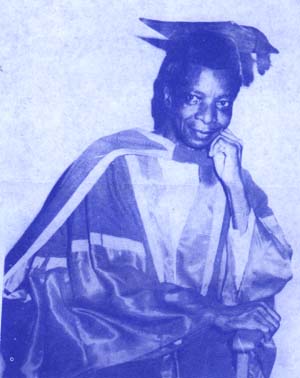![]()
Adegoke Olubummo

Born: April 19, 1923 died: October 26, 1992
place: Orin Ekiti, Ondo State (Nigeria)
B.A. Fourah College, Freetown Sierra Leone (1950); M.A. in Mathematics (1952) Kings College, Newcastle-upon-Tyne, in the University of Durham United Kingdom
Ph.D. (1955) from King's College, Newcastle-upon-Tyne, in the University of Durham United Kingdom
thesis: Studies in the Theory of Linear Spaces; W RogosinskiAdegoke Olubummo was the son of the honored first literate Olorin of Orin, H.R.H. Oba William Adekolawolu Olubummo II and Olori Abigael Osarayi Olubommo. As a child of parents of high honor, he received an excellent education at Methodist schools in which he worked (Ifaki Methodist School) as a pupil teacher in 1937. All three of Adegoke Olubummo's children are mathematicians. His daugher Yewande Olubummo is currently in the U..S. as an assistant professor of mathematics at Spelman College.
In 1938, at the age of 14, Olubumo entered Wesley College in Ibadan. In 1942 he returned to his alma mater as ateacher, and for thenext few years taught at primary and secondary schools in Nigeria, Ghana (then the Gold Coast), and Sierra Leone. He earned is B.A. from Fourah College in Freetown Sierra Leone (1950).
Adegoke Olubummo earned his M.A. in Mathematics (1952) and his Ph.D. (1955) from King's College, University of Durham in Castle-Upon-Tyne, United Kingdom. In 1955, he began as a lecturer in the mathematics department the University College, Ibadan, Nigeria where he was promoted to (Full) Professor in 1964. Dr. Olobummo was head of the Department of Mathematics at the University of Ibadan for many years, where he was determined to create qualitative traditions in spite of the handicaps of development in a young African university. In 1985 he retired from the University of Ibadan, and became Dean of the Faculty of Science of Ondo State University.
Dr. Adegoke Olubummo, with James Ezeilo and Chike Obi, was one of a trio of black (indigenous) mathematicians who pioneered modern mathematics research in Nigeria. He pioneered the establishment of the Forum for Functional Analysis and its Applications and the Nigerian Mathematical Society. Many of his Ibadan students went off to earn the doctorate in mathematics; e.g., T. O. Adewoye, Olusola Akinyele, S. K. Assiamous, V. A. Babola, the Senator S. O. Iyahen, E. O. Oshabi, and O. Popoola.
The following are articles about Adegoki Olubummo:
Sowunmi, C. O. A. Professor Adegoke Olubumm\d o [1923--1992]---a multidimensional view. Memorial issue for Professor Adegoke Olubumm\d o. J. Nigerian Math. Soc. 11 (1992), no. 2, iii--iv.
Akiny\d ele, O. Adegoke Olubumm\d o [1923--1992]: the man, the teacher, the mathematician. Memorial issue for Professor Adegoke Olubumm\d o. J. Nigerian Math. Soc. 11 (1992), no. 2, i--ii.
\{Memorial issue for Professor Adegoke Olubumm\d o\}. J. Nigerian Math. Soc. {\bf 11} (1992), no. 2. Nigerian Mathematical Society, University of Ibadan, Department of Mathematics, Ibadan, 1992. pp. i--iv and 1--131.
RESEARCH
Dr. Adegoke Olubummo's interest was Functional Analysis, primarily in Banach algebras, ordered vector spaces, semigroups of linear operators, and abstract harmonic analysis. Mathematics Reviews lists 24 papers published by Professor Olubummo:
(with Assiamoua, V. S. K.), Fourier-Stieltjes transforms of vector-valued measures on compact groups , Acta Sci. Math. (Szeged) 53 (1989), no. 3-4, 301--307.
A note on irregular measures , J. Nigerian Math. Soc. 5 (1986), 11--16 (1989).
An approximation theorem for semigroups of operators , Portugal. Math. 40 (1981), no. 4, 383--391 (1985).
$(0,\,A)$-semigroups on $L\sb{p}(G)$ commuting with translations are $(C\sb{0})$ , Acta Sci. Math. (Szeged) 46 (1983), no. 1-4, 323--328.
Unbounded multiplier operators , J. Math. Anal. Appl. 71 (1979), no. 2, 359--365.
Semigroups of multipliers associated with semigroups of operators , Proc. Amer. Math. Soc. 49 (1975), no. 1, 161--168.
(with Rajagopalan, M.) Anti-self dual groups , Comment. Math. Prace Mat. 19 (1976), no. 1, 111--112.
(with Babalola, V. A.) Semigroups of operators commuting with translations , Colloq. Math. 31 (1974), 253--258.
A decomposition theorem for finitely additive measures on a discrete commutative semigroup , Nigerian J. Sci. 4 (1970), 101--110.
Finitely additive measures on the non-negative integers , Math. Scand. 24 (1969) 186--194 (1970).
Dissipative ordinary differential operators of even order , Trans. Amer. Math. Soc. 129 1967 130--139.
(with Phillips, R. S.) Dissipative ordinary differential operators , J. Math. Mech. 14 (1965) 929--949.
A note on perturbation theory for semi-groups of operators , Proc. Amer. Math. Soc. 15 (1964) 818--822.
Complemented Banach algebras, Canad. J. Math. 16 (1964) 149--150.
Weakly compact $B\sp{\#}$-algebras, Proc. Amer. Math. Soc. 14 (1963) 905--908.
Monotone semi-groups of bounded operators, J. Math. Mech. 12 (1963) 385--390.
Operators of finite rank in a reflexive Banach space, Pacific J. Math. 12 (1962) 1023--1027.
On the existence of an absolutely minimal norm in a Banach algebra, Proc. Amer. Math. Soc. 11 (1960) 718--722.
$B\sp{\sharp }$-algebras with a certain set of left completely continuous elements, J. London Math. Soc. 34 (1959) 367--369.
The Laplace-Stieltjes transform of an increasing vector-valued function, Quart. J. Math. Oxford Ser. (2) 8 (1957), 97--107.
Left completely continuous $B\sharp$-algebras, J. London Math. Soc. 32 (1957), 270--276.
thanks to Glo Aniebo for help with this project
references: yewande olubummo (daughter); reference1 ; reference2; Rosemary Papaeliou who acorrected biographical data and dded, "I knew him well. He had a great knowledge of music and drama, enjoyed ballroom dancing as a recreation and we together attended most of the productions of The People's Theatre, always visiting the Green Room during the intervals."
![]()
The web pages
MATHEMATICIANS OF THE AFRICAN
DIASPORA
are brought to you by
The Mathematics Department of
The State University of New York at Buffalo.
They are created and maintained by
Scott W. Williams
Professor of Mathematics